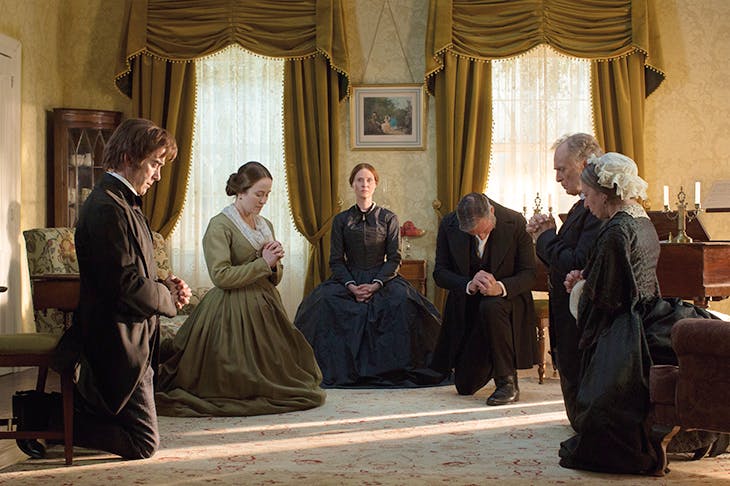Films can be poetry — or like poetry; or poetic, at least — but can poetry ever be film? That is our question for today, and I’ll attempt to answer it, although there is absolutely no saying that I’ll be able to do so. Always touch and go, that.
A Quiet Passion is Terence Davies’s biopic of the 19th-century American poet Emily Dickinson, author of ‘Hope is the thing with feathers/ That perches in the soul’ and ‘Because I Could Not Stop for Death’ (look it up; do) and, all in all, 1,800 (incredibly wonderful) poems, of which only 10 were published in her lifetime. Who was this woman? She’s fixed in our minds as a recluse who would only talk from behind her bedroom door, but was she always? Is it the truth of her that matters, or the truth of her poetry? Can the two become one?
As a general rule poets do not make the best film characters. Poets are not crime-fighters who are part spider or dress like bats. What a poet does is so meticulously precise, and innermost, it may even be inherently uncinematic in form. Further, films about poets tend to murder the poetry itself, or ignore it, in favour of a reductive character study that will have, say, Dylan Thomas drinking pubs dry, or Keats beginning to cough (Oh no, how is that going to end?). Worst poetry film ever? Dead Poets Society, in which Robin Williams does such a brilliant job teaching poetry that his students end up loving him, and not the poems. (How I longed for him to be Ofsted-ed, and then dismissed.)
So how does Davies fare? He gives it to us straight(ish). It is chronological, yet told in a series of disconnected scenes, and not fully cradle to grave, as it opens with Emily (Emma Bell) as a teenager being chastised in school for her non-conformity. Time passes, until Bell elides into Cynthia Nixon, formerly Miranda from Sex and the City, and she is terrific, in fact. Indeed, she so disappears into Emily, is so this person, in mind and body, I didn’t think of shoes once. Or handbags. Or Carrie’s break-up with Aiden. Or any of that.
Emily lives in Amherst, Massachusetts, with her father (Keith Carradine), mother (Joanna Bacon), brother (Duncan Duff) and sister (Jennifer Ehle). They are her world because she has no other world. At this time, we are given to understand, women were so stifled by the patriarchy, and strict Puritan morality, that their lives were stiflingly dull. You feel it. Clocks tick as they stare into space. Emily, her mother finally begs, will you play us a hymn at the piano? And that was it, pretty much, for a Saturday night.
The aesthetic of the first hour is pure period drama, with beautiful frocks and horses and carriages and sunlight streaming in through windows in that painterly way, while Emily is vivacious, sociable, madly contradictory and fiercely opinionated. With a script by Davies, she is also sharp and funny, perhaps too much so. Was everything she said a gem? (She also has a friend who is so wisecracking you will want to punch her in the head.) But you can certainly sense her spirit being crushed. She must ask her father for permission to write. She suffers bereavements, disappointments in friendship and romance. Her crush on a married reverend, who does not reciprocate, marks the beginning of her withdrawal, and descent into bitterness, despair, isolation. The second hour moves as glacially and as disconnectedly as the first, but is more deeply affecting. I’ll say one thing for our Terence: he does not shirk from death.
From his first autobiographical works (Distant Voices, Still Lives; The Long Day Closes) through to his later literary adaptations (The House of Mirth, The Deep Blue Sea, Sunset Song), Davies has always made highly personal firms, and this is a highly personal interpretation of Dickinson. Facts have been altered. (For instance, Emily never met her brother’s mistress, as she does here, and the whole married reverend business may or may not have happened; nobody knows.) Perhaps, in exploring suppressed longings, this says more about Davies than Dickinson? And where is the poetry? We see Emily scribbling by lamplight — of course we do — and threading her poems into little books, and also reciting them via voice-over, but do they coalesce as one? The woman and the work? Not especially, I have to say. They wink at each other. They are related. But never fully mesh.
Still, as far as films about poets go, this succeeds more than most, particularly with that terrific central performance, and there’s no drinking pubs dry, or coughing, or inspirational teachers, or any of that. But the poetry is where it’s at: ‘Because I could not stop for Death —/ He kindly stopped for me —/ The Carriage held but just Ourselves —/ And Immortality.’ And it may be all we need.
Got something to add? Join the discussion and comment below.
Get 10 issues for just $10
Subscribe to The Spectator Australia today for the next 10 magazine issues, plus full online access, for just $10.
You might disagree with half of it, but you’ll enjoy reading all of it. Try your first month for free, then just $2 a week for the remainder of your first year.














Comments
Don't miss out
Join the conversation with other Spectator Australia readers. Subscribe to leave a comment.
SUBSCRIBEAlready a subscriber? Log in